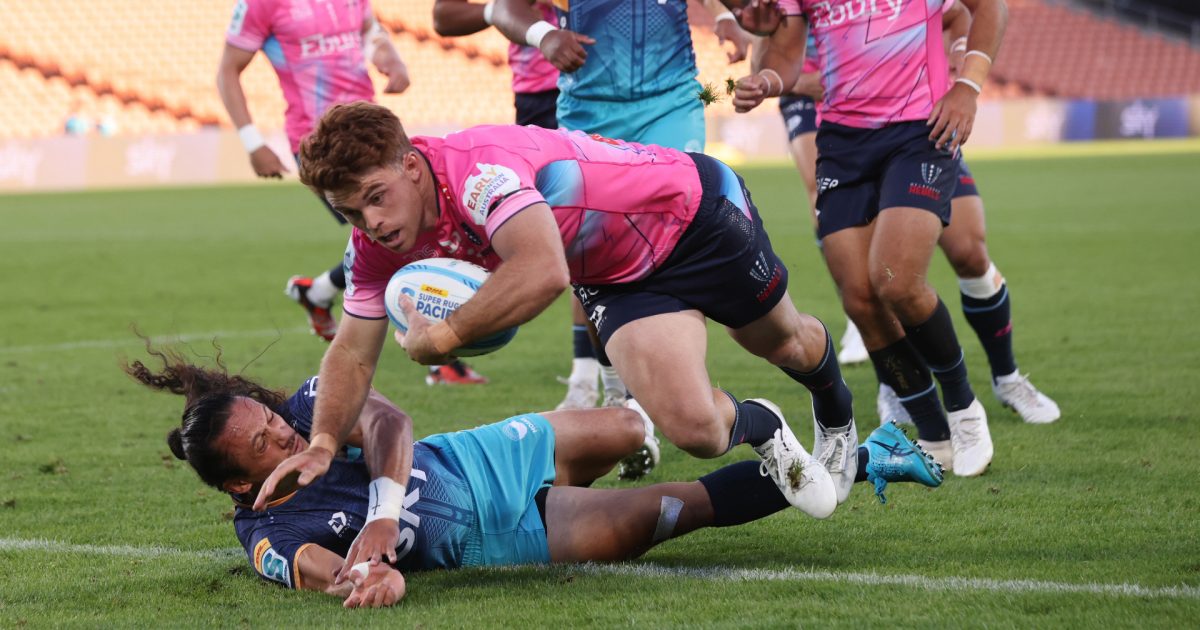Kellaway shines, Savea makes history: Three takeaways from Moana vs Rebels

For all of the chatter and speculation about the state of the Melbourne Rebels, the players have continued to let their actions on the field do the talking during a strong start to the season.
The Rebels may have started their campaign with a big loss to the Brumbies, but after bouncing back last week at home, they’ve improved to two wins after a Round Three 23-29 win over Moana Pasifika in New Zealand.
Playmaker Carter Gordon steered the team around the park with purpose and intent, but the forwards deserve plenty of praise. They were the ones who laid the platform for Gordon and Co. to fire.
However, while it was the Melbourne Rebels’ night, a Super Rugby great stole the show with a try about 10 minutes into the second term. That great is Julian Savea who now stands alone as the all-time try scoring record holder in Super Rugby Pacific.
History was made in Hamilton.
Carter Gordon is Australia’s form fly-half
There’s something unique about Carter Gordon. Whether it’s shades of Stephen Larkham or even All Blacks great Dan Carter, there’s something truly special about the Rebels’ playmaker.
Gordon, 23, was met by a fork in the road after the Wallabies’ World Cup disaster. The youngster could’ve let that define the early stages of his career, or venture towards a brighter tomorrow.
The Queenslander has bounced back in a big way during the opening three rounds of Super Rugby Pacific. Gordon has looked smart, focused and supremely talented.
Playing against Moana Pasifika, it was Gordon’s aggressiveness on both sides of the ball that was particularly impressive. The playmaker’s job is to make plays happen – and he does everything possible to make that happen.
Take Andrew Kellaway’s opener as an example. Gordon threw both a quick and accurate pass to Jake Strachan as the Moana Pasifika defenders rushed up.
But beyond that, it’s Gordon’s eagerness to seize half opportunities – especially down the short side. There were shades of that during the Test season last year, and Gordon looks ready.
Noah Lolesio, Ben Donaldson, Tom Lynagh and Tane Edmed could all justifiably be handed starts for the Wallabies this year, but it’s Gordon who makes the most sense.
Carter Gordon looks the most Test-ready in 2024 out of any Australian fly-half.
The footwork from Kells 👌✨
Rebels on the board 👊#SuperRugbyPacific #MOAvREB pic.twitter.com/fCxyaBBIxy
— Super Rugby Pacific (@SuperRugby) March 8, 2024
Andrew Kellaway was good on the wing but could’ve been great out the back
After starting the opening two rounds of the season at fullback, Andrew Kellaway shifted outside for the Rebels’ Round Three clash with Moana Pasifika in Hamilton.
Kellaway was equal-fourth out of all players in Super Rugby Pacific for carries (25), tied-seventh for linebreaks with three, and was among the leaders for defenders beaten before this fixture.
But coach Kevin Foote opted for a change by shifting the Wallaby from fullback to the left wing. Kellaway is no stranger to starting on the edge, but it was still an interesting call.
Kellaway, 28, burst onto the Test rugby scene years ago with the Wallabies as a try-scoring machine on the wing. There were shades of that on Friday night, too.
The Wallaby was incredibly active during the opening 10 minutes in particular, which included a well-worked try. Kellaway beat two defenders, including Julian Savea, with one big step off his left foot.
“He’s really developed well into a world-class finisher,” former All Black Aaron Cruden said on Sky Sport at half-time. “He’s elusive, he’s strong, he’s not your biggest outside back but he always seems to get the team going forward and you want to play off the back of that.”
Kellaway continued to impress in bursts, sure, but the Australian could be in the thick of the action even more if he returns to fullback.
Jake Strachan was solid out the back and is a worthy understudy for Kellaway this season, but there’s no question that the Wallaby adds much more value with the No. 15 on his back.
SIXTY-ONE 🤩
Julian Savea sets the #SuperRugbyPacific all-time try scoring record 💥#SuperRugbyPacific #MOAvREB pic.twitter.com/31o3WQtldr
— Super Rugby Pacific (@SuperRugby) March 8, 2024
Try scoring machine Julian Savea makes Super Rugby Pacific history
Julian Savea has done it. After being locked on 60 Super Rugby tries along with former Waratahs fullback Israel Folau for quite some time, Savea now stands alone above the rest.
Lining up at inside centre for Moana Pasifika on Friday night, Savea scored a decisive try for the hosts in Hamilton – in the context of both the game and history.
Wing Pepesana Patafilo danced across the field and managed to draw in Andrew Kellaway off his wing, which left Julien Savea unmarked on the right edge with history ahead of him.
Savea received a low pass from Patafilo, and after doing well to regather the pass, the former All Black charged in for the record-setting score at Hamilton’s FMG Stadium Waikato.
“What a time to bring it up too, for the 54-Test All Black” Mils Muliaina said on the Sky Sport broadcast. “He takes his spot as the most tries scored in Super Rugby.
“Out to Julian Savea, outstanding!”
As well as Folau, TJ Perenara and Doug Howlett are also among those high on the try-scoring list. This is by no means an easy thing to do, and that has to be celebrated.

























